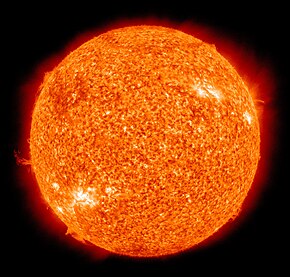Site: http://www.sciencenewsforkids.org/2011/06/not-seeing-sunspots/
Author: Stephen Ornes
The sun is very important for our siruvival from many different aspects. Without the sun, we would freeze on Earth, we would have no food, and we would have much different calendars. Because it is so imperative for our life, scientists are constantly watching the sun, trying to see whether there were any chages to it's surface, temperature, etc. The solar cycle lasts for 11 years, and then changes. When one cycle begins, many spots can be seen on the sun. Most of these spots, some the size of Jupiter can be caused by the magnetic activity that constantly takes place in the universe. Even ancient astronomers have been looking at the spots that appear on the sun for more than 400 years.
However, studies show that this year, the cycle of the sun might not start at the predicted time this year. Scientists say that they cycle could be delayed this year, but that there is also a possibility that it might not happen at all. They haven't been noticing the usual changes the sun goes through when the new cycle of the sun is supposed to start. It is possible that the sun will be going into "hibernation", meanining that it won't be as powerful as it usually is for a few years, or decades. The last time this happened was between 1645 and 1715. Scientists are, however, uncertain in what ways this could affect the climate and weather conditions on Earth, as the atmosphere of our planet has changed dramatically over the last 300 years, because of the greenhouse gasses. Many studies involving the sun's magnetic activity were conducted, and they showed that the magnetic field has gotten much weaker over the past few years. However, the information that was gathered is not enough to determine whether "the sun will be taking a long break".
To me, this doesn't seem very frightening, because scientists are expecting for this change to be temporary. However, I cannot help but wonder whether this could cause a smaller, less severe version of the Ice Age, because of the very cold winters that could take place. As for the scientists' further research, I think that it would be cool if they investigated whythe sun is gowing through such changes, and why the solar cycle is delayed. Maybe, the changes the sun is going through can affect not only the sun itself, but also the moon, and other stars near it.

Author: Stephen Ornes
The sun is very important for our siruvival from many different aspects. Without the sun, we would freeze on Earth, we would have no food, and we would have much different calendars. Because it is so imperative for our life, scientists are constantly watching the sun, trying to see whether there were any chages to it's surface, temperature, etc. The solar cycle lasts for 11 years, and then changes. When one cycle begins, many spots can be seen on the sun. Most of these spots, some the size of Jupiter can be caused by the magnetic activity that constantly takes place in the universe. Even ancient astronomers have been looking at the spots that appear on the sun for more than 400 years.
However, studies show that this year, the cycle of the sun might not start at the predicted time this year. Scientists say that they cycle could be delayed this year, but that there is also a possibility that it might not happen at all. They haven't been noticing the usual changes the sun goes through when the new cycle of the sun is supposed to start. It is possible that the sun will be going into "hibernation", meanining that it won't be as powerful as it usually is for a few years, or decades. The last time this happened was between 1645 and 1715. Scientists are, however, uncertain in what ways this could affect the climate and weather conditions on Earth, as the atmosphere of our planet has changed dramatically over the last 300 years, because of the greenhouse gasses. Many studies involving the sun's magnetic activity were conducted, and they showed that the magnetic field has gotten much weaker over the past few years. However, the information that was gathered is not enough to determine whether "the sun will be taking a long break".
To me, this doesn't seem very frightening, because scientists are expecting for this change to be temporary. However, I cannot help but wonder whether this could cause a smaller, less severe version of the Ice Age, because of the very cold winters that could take place. As for the scientists' further research, I think that it would be cool if they investigated whythe sun is gowing through such changes, and why the solar cycle is delayed. Maybe, the changes the sun is going through can affect not only the sun itself, but also the moon, and other stars near it.

This is a really fascinated article. It showed that last year was the year with no sun spots, or 2009. It has been decreasing steadily for awhile. I think it is so interesting that our sun can go into hibernation? With all that energy and no bursts of energy? What will happen to the magnetic field? I wonder if it will weaken.
ReplyDelete